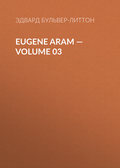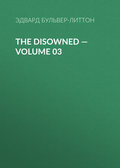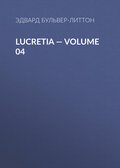
Эдвард Бульвер-Литтон
A Strange Story — Volume 04
My replies seemed to satisfy the lawyer so far, but "how could I aceount for the casket and the knife being found in my room?"
"In no way but this; the window of my study is a door-window opening on the lane, from which any one might enter the room. I was in the habit, not only of going out myself that way, but of admitting through that door any more familiar private acquaintance."
"Whom, for instance?"
I hesitated a moment, and then said, with a significance I could not forbear, "Mr. Margrave! He would know the locale perfectly; he would know that the door was rarely bolted from within during the daytime: he could enter at all hours; he could place, or instruct any one to deposit, the knife and casket in my bureau, which he knew I never kept locked; it contained no secrets, no private correspondence,—chiefly surgical implements, or such things as I might want for professional experiments."
"Mr. Margrave! But you cannot suspect him—a lively, charming young man, against whose character not a whisper was ever heard—of connivance with such a charge against you,—a connivance that would implicate him in the murder itself; for if you are accused wrongfully, he who accuses you is either the criminal or the criminal's accomplice, his instigator or his tool."
"Mr. Stanton," I said firmly, after a moment's pause, "I do suspect Mr. Margrave of a hand in this crime. Sir Philip, on seeing him at the mayor's house, expressed a strong abhorrence of him, more than hinted at crimes he had committed, appointed me to come to Derval Court the day after that on which the murder was committed. Sir Philip had known something of this Margrave in the East; Margrave might dread exposure, revelations—of what I know not; but, strange as it may seem to you, it is my conviction that this young man, apparently so gay and so thoughtless, is the real criminal, and in some way which I cannot conjecture has employed this lying vagabond in the fabrication of a charge against myself. Reflect: of Mr. Margrave's antecedents we know nothing; of them nothing was known even by the young gentleman who first introduced him to the society of this town. If you would serve and save me, it is to that quarter that you will direct your vigilant and unrelaxing researches."
I had scarcely so said when I repented my candour, for I observed in the face of Mr. Stanton a sudden revulsion of feeling, an utter incredulity of the accusation I had thus hazarded, and for the first time a doubt of my own innocence. The fascination exercised by Margrave was universal; nor was it to be wondered at: for besides the charm of his joyous presence, he seemed so singularly free from even the errors common enough with the young,—so gay and boon a companion, yet a shunner of wine; so dazzling in aspect, so more than beautiful, so courted, so idolized by women, yet no tale of seduction, of profligacy, attached to his name! As to his antecedents, he had so frankly owned himself a natural son, a nobody, a traveller, an idler; his expenses, though lavish, were so unostentatious, so regularly defrayed; he was so wholly the reverse of the character assigned to criminals, that it seemed as absurd to bring a charge of homicide against a butterfly or a goldfinch as against this seemingly innocent and delightful favourite of humanity and nature.
However, Mr. Stanton said little or nothing, and shortly afterwards left me, with a dry expression of hope that my innocence would be cleared in spite of evidence that, he was bound to say, was of the most serious character.
I was exhausted. I fell into a profound sleep early that night; it might be a little after twelve when I woke, and woke as fully, as completely, as much restored to life and consciousness, as it was then my habit to be at the break of day. And so waking, I saw, on the wall opposite my bed, the same luminous phantom I had seen in the wizard's study at Derval Court. I have read in Scandinavian legends of an apparition called the Scin-Laeca, or shining corpse. It is supposed in the northern superstition, sometimes to haunt sepulchres, sometimes to foretell doom. It is the spectre of a human body seen in a phosphoric light; and so exactly did this phantom correspond to the description of such an apparition in Scandinavian fable that I knew not how to give it a better name than that of Scin-Laeca,—the shining corpse.
There it was before me, corpse-like, yet not dead; there, as in the haunted study of the wizard Forman!—the form and the face of Margrave. Constitutionally, my nerves are strong, and my temper hardy, and now I was resolved to battle against any impression which my senses might receive from my own deluding fancies. Things that witnessed for the first time daunt us witnessed for the second time lose their terror. I rose from my bed with a bold aspect, I approached the phantom with a firm step; but when within two paces of it, and my hand outstretched to touch it, my arm became fixed in air, my feet locked to the ground. I did not experience fear; I felt that my heart beat regularly, but an invincible something opposed itself to me. I stood as if turned to stone. And then from the lips of this phantom there came a voice, but a voice which seemed borne from a great distance,—very low, muffled, and yet distinct; I could not even be sure that my ear heard it, or whether the sound was not conveyed to me by an inner sense.
"I, and I alone, can save and deliver you," said the voice. "I will do so; and the conditions I ask, in return, are simple and easy."
"Fiend or spectre, or mere delusion of my own brain," cried I, "there can be no compact between thee and me. I despise thy malice, I reject thy services; I accept no conditions to escape from the one or to obtain the other."
"You may give a different answer when I ask again."
The Scin-Laeca slowly waned, and, fading first into a paler shadow, then vanished. I rejoiced at the reply I had given. Two days elapsed before Mr. Stanton again came to me; in the interval the Scin-Laeca did not reappear. I had mustered all my courage, all my common-sense, noted down all the weak points of the false evidence against me, and felt calm and supported by the strength of my innocence.
The first few words of the solicitor dashed all my courage to the ground; for I was anxious to hear news of Lilian, anxious to have some message from her that might cheer and strengthen me, and my first question was this,—
"Mr. Stanton, you are aware that I am engaged in marriage to Miss Ashleigh. Your family are not unacquainted with her. What says, what thinks she of this monstrous charge against her betrothed?"
"I was for two hours at Mrs. Ashleigh's house last evening," replied the lawyer; "she was naturally anxious to see me as employed in your defence. Who do you think was there? Who, eager to defend you, to express his persuasion of your innocence, to declare his conviction that the real criminal would be soon discovered,—who but that same Mr. Margrave; whom, pardon me my frankness, you so rashly and groundlessly suspected."
"Heavens! Do you say that he is received in that house; that he—he is familiarly admitted to her presence?"
"My good sir, why these unjust prepossessions against a true friend? It was as your friend that, as soon as the charge against you amazed and shocked the town of L——, Mr. Margrave called on Mrs. Ashleigh, presented to her by Miss Brabazon, and was so cheering and hopeful that—"
"Enough!" I exclaimed,—"enough!"
I paced the room in a state of excitement and rage, which the lawyer in vain endeavoured to calm, until at length I halted abruptly: "Well, and you saw Miss Ashleigh? What message does she send to me—her betrothed?"
Mr. Stanton looked confused. "Message! Consider, sir, Miss Ashleigh's situation—the delicacy—and—and—"
"I understand, no message, no word, from a young lady so respectable to a man accused of murder."
Mr. Stanton was silent for some moments, and then said quietly, "Let us change this subject; let us think of what more immediately presses. I see you have been making some notes: may I look at them?"
I composed myself and sat down. "This accuser! Have inquiries really been made as to himself, and his statement of his own proceedings? He comes, he says, from America: in what ship? At what port did he land? Is there any evidence to corroborate his story of the relations he tried to discover; of the inn at which he first put up, and to which he could not find his way?"
"Your suggestions are sensible, Dr. Fenwick. I have forestalled them. It is true that the man lodged at a small inn,—the Rising Sun; true that lie made inquiries about some relations of the name of Walls, who formerly resided at L——, and afterwards removed to a village ten miles distant,—two brothers, tradesmen of small means but respectable character. He at first refused to say at what seaport he landed, in what ship he sailed. I suspect that he has now told a falsehood as to these matters. I sent my clerk to Southampton, for it is there he said that he was put on shore; we shall see: the man himself is detained in close custody. I hear that his manner is strange and excitable; but that he preserves silence as much as possible. It is generally believed that he is a bad character, perhaps a returned convict, and that this is the true reason why he so long delayed giving evidence, and has been since so reluctant to account for himself. But even if his testimony should be impugned, should break down, still we should have to account for the fact that the casket and the case-knife were found in your bureau; for, granting that a person could, in your absence, have entered your study and placed the articles in your bureau, it is clear that such a person must have been well acquainted with your house, and this stranger to L—— could not have possessed that knowledge."
"Of course not. Mr. Margrave did possess it!"
"Mr. Margrave again! oh, sir!"
I arose and moved away with an impatient gesture. I could not trust myself to speak. That night I did not sleep; I watched impatiently, gazing on the opposite wall for the gleam of the Scin-Laeca. But the night passed away, and the spectre did not appear.







